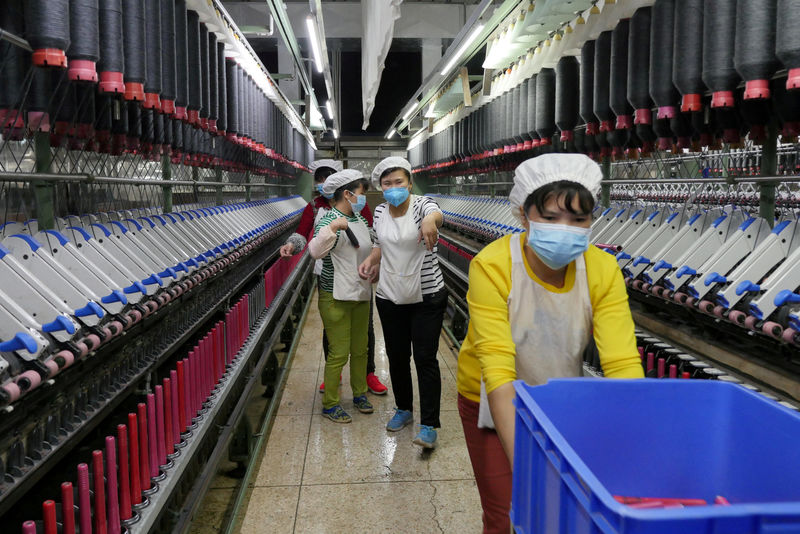(Bloomberg) -- Terms of Trade is a daily newsletter that untangles a world embroiled in trade wars. Sign up here.
Another day, another round of bad news highlighting the risk that the global economy is headed for a serious downturn.
China reported the weakest growth in industrial output since 2002. Germany’s economy shrank as exports slumped, and euro-area production plunged the most in more than three years as the overall expansion cooled. U.S. and U.K. bond markets sent their biggest recession warnings since the global financial crisis.
News from the economic giants dented the market relief in the wake of U.S. President Donald Trump’s decision to delay some tariffs on Beijing. European stocks declined on Wednesday and bonds rose. The gap between two-year and 10-year government debt in both the U.K. and U.S. fell below zero, a shift that typically predates a contraction.
With trade spats, cooling global demand and geopolitical crises all coalescing to hit growth, the world economy is heading for its weakest expansion since the financial crisis. Central banks have rushed in to provide support, with the U.S. Federal Reserve among those cutting interest rates in recent weeks. The European Central Bank is widely expected to follow next month.
The downturn is also ramping up pressure on governments to step up to the plate with fiscal stimulus.
The impact of trade tensions “on business uncertainty in terms of sapping export confidence and investment is bad, and that’s persisting,” said Mike Gallagher, head of strategy at Continuum Economics in London. “The broader thrust is still negative for the global economy as far as the trade position is concerned.”
German big-name companies from Siemens to Daimler have issued warnings about pressure on sales and political uncertainty. The economy’s 0.1% contraction , paired with a protracted slump in business expectations, is the result of what Citigroup (NYSE:C) described as an “unholy trinity” of China’s slowdown, U.S. trade wars and Brexit.
“In addition to the cyclical weakening of the global economy, especially in China, the fast-moving global trade conflict is damping growth,” said Alexander Krueger, chief economist at Bankhaus Lampe. “Unclear Brexit terms and growing geopolitical tensions also have a damping effect. All these factors are likely to weigh on economic activity.”
What Bloomberg’s Economists Say
“The data flow from industry keeps getting worse, particularly in the euro area, which is highly exposed to external demand.”“The data flow from industry keeps getting worse, particularly in the euro area, which is highly exposed to external demand.”
--David Powell. Read the full EURO-AREA REACT
The weakness is already weighing heavily on the euro area, where France and Spain are also slowing and Italy’s situation looks increasingly dire. The latest numbers on Wednesday showed industrial production in the currency bloc plunged 1.6% in June. Economic growth slowed to 0.2% in the second quarter, half the pace of the previous three months.
Tariff Woes
In China, growth in industry slowed sharply to 4.8% from 6.3%. On Monday, the world’s second-largest economy reported a drop in credit-demand growth, adding pressure on Chinese officials to boost stimulus. In June, the government unveiled a plan to help spur demand for automobiles and electronics.
The tariff delay announced by the U.S. on Tuesday “doesn’t really change the outlook on the trade tensions,” said Louis Kuijs, chief Asia economist at Oxford Economics in Hong Kong. “We expect further policy easing in the coming months to help stabilize growth amid the above headwinds.”
Just this week, Dusseldorf-based Henkel AG issued a profit warning that summed up Germany’s woes. The industrial firm is facing pressure on two fronts, a slowdown in the auto industry and weaker demand in China, the same environment that’s crippled manufacturing across the country.
“Germany has tooled up as this massive global manufacturer, benefiting from lower interest rates and a weaker currency than if they hadn’t been in the euro,” said Trevor Greetham of Royal London Asset Management. “And now the world’s deglobalizing, and we’re at the low ebb in the business cycle. So its really hard pressure.”
